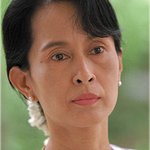To support and inspire Rotary club members, community leaders and youth to work for peace in their daily lives, Rotary International President Sakuji Tanaka of Japan will hold the second of three Rotary Global Peace Forums in Honolulu (25-27 Jan.).
Aung San Suu Kyi, Burma’s democracy leader and Nobel Peace Prize recipient, will receive the Hawaii Peace Award and deliver the forum’s keynote address on Saturday, Jan. 26.
The three-day forum will bring together high-level officials, community leaders and students and alumni of Rotary’s Peace Centers program, a peace studies initiative that provides future leaders with the skills and tools needed to resolve conflicts and promote peace. Also in attendance will be approximately 800 Rotary members and other supporters of Rotary’s peace efforts from around the world.
“As a member of the first generation to grow up in Japan after World War II, I understand the importance of peace and its connection to our well-being,” Tanaka said. “Peace is not something that can only be achieved through agreements, by governments, or through heroic struggles. It is something that we can find and that we can achieve, every day and in many simple ways.”
The Rotary Global Peace Forum in Honolulu is one of three international gatherings to be convened by the global humanitarian service organization to advance peace and understanding throughout the world. The other forum sites include Berlin (30 Nov. – 2 Dec. 2012) and Hiroshima (17-18 May 2013). Each host city was heavily impacted by the events of World War II, and now represents the healing power of sustainable peace between nations.
“While these events will take place at historic sites, the main emphasis will be on the future and youth,” said Tanaka. “Rotary builds peace and international understanding through education, humanitarian service and connecting with youth. To ensure a lasting legacy in this arena we must engage young people and the new generations to come in a meaningful way and empower them to carry Rotary’s peace-building efforts into the future.”
Rotary clubs have long embraced the call for peace at the grassroots level by addressing the underlying causes of conflict and violence, such as hunger, poverty, disease and illiteracy. Ten years ago, the international humanitarian organization of volunteer service clubs decided to take a direct approach to world understanding by providing future leaders with the tools they need to “wage peace” on the global stage.
Since 2002, Rotary clubs, each year sponsor up to 60 scholars who embark on one to two years of study to earn master’s-level degrees in peace and conflict resolution at Rotary Centers for International Studies at leading universities in England, Japan, Australia, Sweden, and the United States.
• Uppsala University, Sweden
• University of Bradford, UK
• University of Queensland, Australia
• International Christian University, Japan
• Duke University and the University of North Carolina at Chapel Hill, USA
Established in 2004, the Rotary Peace Center at Chulalongkorn University in Bangkok, Thailand offers a three-month professional development certificate in peace and conflict studies each year for up to 50 mid-level professionals from related fields, such as public health, education, international law, economic development, journalism, and social justice.
Rotary Peace Center alumna Cherine Badawi, who attended the International Christian University center in Tokyo, is now a coordinator of curriculum and training for Generation Waking Up, an international youth leadership and empowerment NGO based in San Francisco. She says that Rotary Peace Centers powerfully legitimize and support what she considers to be the most important work of our time: cultivating peace on our planet. “Peace is so much more than the absence of war,” Badawi adds. “It is the presence of thriving and just communities that value human security and dignity, environmental sustainability and the rights of present and future generations to get their needs met regardless of social identity.”
Applications for the 2014-15 class of Rotary’s Peace Center program will be available in January 2013, and are due by 1 July 2013.
Rotary is a global humanitarian organization with more than 1.2 million members in 34,000 Rotary clubs in over 200 countries and geographical areas. Rotary members are men and women who are business, professional and community leaders with a shared commitment to make the world a better place through humanitarian service.
Source: PR Newswire






